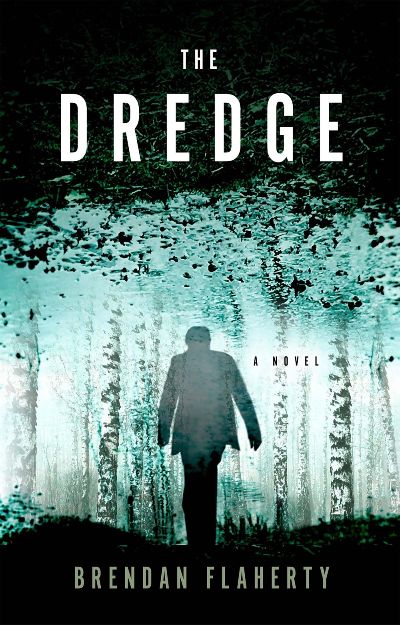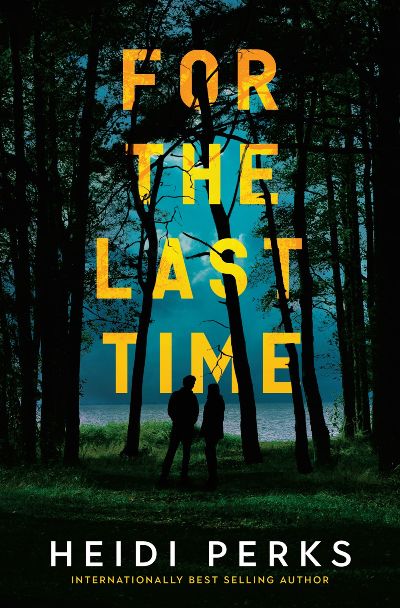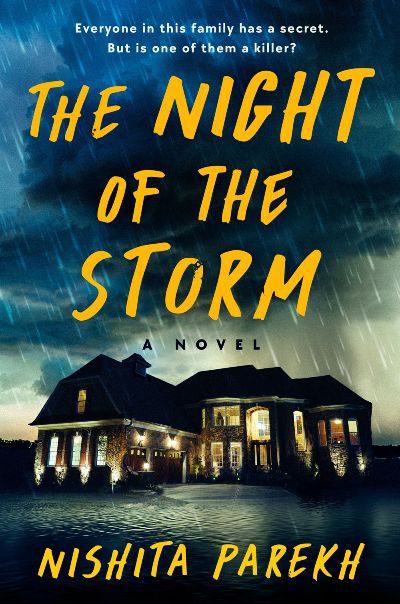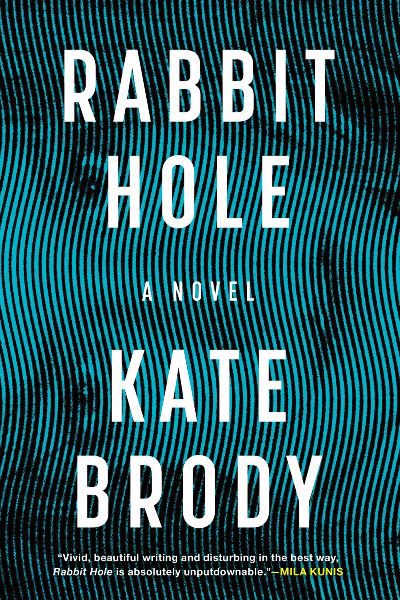“Some families are haunted. The stuff of the past, the traumas and the ghosts—they just go on and on,” thinks Caleb “Cale” Casey, a successful real-estate broker in Hawaii who has been estranged for almost 30 years from his brother Ambrose, who runs a construction company back in their small Connecticut hometown. Both are tormented by a terrible secret that they buried as teenagers in Gibbs Pond. When a real-estate developer announces plans to dredge the pond in preparation for further development, Cale reluctantly returns home. Unbeknownst to the brothers, Lily Rowe, the contractor in charge of the dredging, also suffers from a dark family history, a childhood of abuse and neglect, shared with her troubled sibling Ray, that led to a shocking act of violence. How these well-drawn traumatized characters and their secrets collide in the present day, permanently changing the course of their lives, is the theme of Flaherty’s beautifully written debut. His Connecticut is not the monied suburbia of Rick Moody and John Cheever, but a rural working-class community more reminiscent of Daniel Woodrell’s Ozark mountain towns. After a strong buildup, the conclusion felt a bit anticlimactic. Still, this sad novel about the corrosive effects of family trauma and pain will linger in readers’ minds.
Family Life
At first, this novel seems to be a predictable, mildly entertaining thriller. Erin and Will take themselves off to marriage counseling because something has gone wrong, at least for Erin, who is suddenly putting her husband at arm’s length. But what’s the source of the problem? Even their counselor, Maggie, becomes consumed trying to understand what has gone awry in their marriage, especially when Will is, annoyingly, nearly the perfect man. Then, out of nowhere, Perks drops a clue that made my head spin, cranks up the narrative’s pace, and pulls us deeper into the disturbing past of Erin and Maggie. Since this is from multiple perspectives, and jumps skillfully around the narrative time-line, readers will have fun trying to put this complex, fractured and totally compelling story together. A perfect read for fans of Lisa Jewell and B.A. Paris.
Prepare to fall hard for Lenny Marks, the awkward, overthinking, lonely character in Mayne’s emotional debut mystery. Helena, or Lenny, is an Australian primary-school teacher. She’s fine in the classroom, as her self-discipline means she sticks religiously to lesson plans. She also gets along well with kids, but the same can’t be said for her interactions with colleagues, whom she mostly ignores, except for Ashleigh and Amy. These are the women whom Lenny has decided will be her friends—social workers and a kind former foster-mom having long encouraged her to speak to others and get out more. (Meanwhile, Asheigh and Amy say things to Lenny like, “I love that you don’t care what you look like”). But she’s trudging along mostly fine until the letter. It arrives at the school from the state parole board and sets Lenny into a spin while Mayne, tantalizingly, lets us into the full, shocking story of Lenny’s early life. Be ready for some very sad moments, including scenes of domestic violence toward children. I just adore this character and this book and will be thinking of Lenny for years (once I finish crying). Mayne’s captivating work might bring you back to an old Oprah’s Book Club favorite, Wally Lamb’s She’s Come Undone.
Judith and Katherine, or as they prefer, Jude and Kat, are mirror-image identical twins (they have the same features on opposite sides of their bodies, such as the same birthmark on opposite shoulders). But there is one big difference. Jude can remember all of their 22 years, but Kat has recently survived a terrible car accident that has left her with amnesia. Experiencing everything “again for the very first time,” she relies on Jude to tell her their life story, because, Jude says, their mother is dead and their father took off years ago. Some things seem puzzling, such as why the photos of their before-the-accident European trip don’t show the sisters at all, only landmarks. Readers learn why in those sections of the book that look at life before the crash, when the girls and their mother left mainstream society to live with the controlling King Bash, whose mantra was “What you think, is.” The pressure to will happiness and satisfaction into being, and the child abuse led by Bash, brews a toxic storm that Jude tries to keep in their past. But the past threatens to explode when a mysterious figure starts turning up at random places in the present. Kahler has a quietly compelling way of revealing secrets and of portraying a close sibling bond, creating an unusual debut novel (as Karen Abbott, Kahler is an Edgar Award nominee for Best Fact Crime for The Ghosts of Eden Park) that will be a hit with those who enjoyed the recent religious-cult documentaries Shiny Happy People and Keep Sweet: Pray and Obey
The scene: Hurricane Harvey hitting affluent Sugar Land, TX, in 2017. Readers will fear the worst, knowing how bad the storm became, but Jia Shah feels she’ll be safe at her sister Seema’s sprawling, ostentatious house. Her brother-in-law, who luckily knows everything, assures all that nothing can happen to his house. Misogyny’R’Us mother-in-law and overbearing sister notwithstanding, Jia believes that once she and her son ride out the storm—and her family’s endless comments about her dire fate as a divorcee—they can get back to life as they knew it. Then Jia notices that the neighborhood seems curiously empty. Except, that is, for a neighbor who stares in the window. Soon things become far more than just creepy as the bodies start to pile up. Debut author Parekh builds tension wonderfully as the storms outside and inside the house threaten to wipe out everything Jia holds dear; she also excels at provoking exasperation at the backbiting family’s antics while crammed into an inescapable nightmare. For those who like locked-room and closed-circle dramas.
Theodora, or Teddy, Angstrom’s father, died by suicide at the 10-year anniversary of her older sister, Angie’s, disappearance as a teenager. Her mother is now to be found lying on the floor with her ancient dog, “Two commas facing one another, small nothing between them.” It’s up to Teddy to make arrangements, exhausted though she is with her teaching job on top of this unwanted task. While doing so, she discovers that her father was on a relentless quest to find Angie, and his failure seems to have been the last straw. Learning that Angie’s disappearance is a hot topic on the message-board site Reddit, where Teddy also finds details about another young woman who disappeared and was found to have run away from her abusive family, sparks curiosity in Teddy. It soon turns to obsession as the amateur sleuth meets a strange, needy young woman who was helping Teddy’s father with his detective work and starts getting messages from a stranger who might know more about Angie’s fate, if she can only find him. As the twisting tale unwinds, unsavory details about fans of true crime, and of message boards where vicious and glib voyeurs can anonymously post intimate questions and tacky rumors about crime victims, will open readers’ eyes to survivors’ reality. A gritty, realistically ambivalent look at how insiders and outsiders experience crime, with a realistic main character to boot.
This unexpected and brilliant work examines the work of life: self love, self forgiveness, and the need to have others see us as we really are. Cambridge, MA psychologist Dr. Gregory Weber’s life is chugging along, grumpy teenager daughter notwithstanding, despite Gregory living every day with a horrible mistake he made when he was 17, something he’s told nobody about and that stops every relationship from being whole. All is turned upside down when a patient who claims he asked her to start therapy shows up, a woman he could swear he never encountered before. In no time, he’s deeply in love this intriguing woman and desperate to see every Wednesday at 1:00, even though from the beginning she takes his seat at each session and insists that he’s in the patient role. What happens over time, with old and new secrets increasingly working their way toward the surface, threatens to destroy Gregory’s life as he knows it. The ending here, which includes a startling twist, is both satisfying and teaches readers profound lessons about the nature of what we owe others and ourselves. A must read.
“With most first times, you don’t really know it’s the beginning of something,” explains Indian surgeon Dr. Kaiser Shah in a letter to his estranged daughter as he prepares for her to visit. And so it is with the practice that engulfed and destroyed Dr. K’s professional life in an unnamed oil-rich country. The task in question—you must remember, he says, it wasn’t his whole job!—is never mentioned directly, and certainly not described, with the doctor convincing himself ever harder that his secrecy is motivated by benevolence toward his lessors. The punishment for stealing is hand amputation, and before he began “helping out Corrections from time to time,” the procedure was much worse. The story of his involvement in this horror, and how it slowly eats his family life, friendships, and any sense of an inner life, is absorbing; adding a striking air is the doctor’s struggle toward self-acceptance in his letters to his daughter. Extremes underlie the violence here: Dr. K’s quiet sycophancy toward his superiors compared to his friend/rival’s gluttony; his love for his daughter compared to her disgust at his work; his initial bootlicking acceptance of the amputation work compared to his feelings about it after a shocking pivot. Those who enjoy an introspective read are the audience for this one, and they will want to go back to Waheed’s award-winning debut, The Collaborator, for more from this author.
Just try not to fall in love with Loretta Plansky, the plucky, 70ish hero of this sweet, feel-good mystery. A widow—she regularly chats with her deceased husband, Norm—Loretta keeps busy in Florida with friends, family, and a mean game of tennis. She and Norm invented the Plansky Toaster Knife, which toasts as you slice—is that that genius or what?—and they managed to accumulate quite the nest egg. Which is helpful, since Loretta’s kids seem to be forever circling, seeking investments and loans for their hair-brained schemes. So when her grandson Will calls from college, and needs to be bailed out because of a DUI, it’s Loretta to the rescue—or at least Loretta’s bank account. Of course, the caller wasn’t Will, and the normally savvy Loretta wakes the next morning to find herself divested of savings, investments, and worse of all, her self-respect. After reviewing her finances and discovering that to get by, she’d need to do the unthinkable and move her 96-year-old father in with her, Loretta makes the shocking decision to head off, track down the thieves, and recoup her funds. This second part of the novel is a real delight. Yes, there is quite a bit of coincidence and luck, but there’s also a wild cast of characters, some surprising relationships, and real evolution on Loretta’s part. For fans of Simon Brett’s Feathering novels and Richard Osman’s Thursday Murder Club series
Since forever, French authors and screenwriters have been writing about heterosexual marriage and infidelity as though these were the only tales worth telling. They are not. But My Husband certainly does a smashing job of upending the traditional domestic narrative with one that is terrifically creepy, darkly obsessive, and uncomfortably humorous. The finely translated novel—a fast read, if there ever was one—is told from the wife’s perspective, a woman who’s entire being is centered on pleasing/controlling her husband. At one point, she describes herself as co-dependent, but that’s like saying the Pope is Catholic. A beautiful woman with a great wardrobe and a lovely apartment in the Paris suburbs, she pretty much ignores her two young children (“Today, I think I can say with certainty that I could survive the death of one of my children, but not of my husband.”) The perfect life? Restricted to her home with her husband, “endless one-on-one time…Sometimes I picture myself alone on the Earth with him.” Got the picture? But the husband isn’t perfect; sometimes when they are sitting on the sofa, watching TV, he’ll be the first to stop holding hands. Infractions like these deserve punishment, usually moving or hiding his personal belongings. It’s mesmerizing, and try as one might, you can’t look away. As the book progresses, the reader’s anxiety mounts, until we reach an ending which is quite the tailspin. Hip reading groups will tear each other apart over this book.










